Related Research Articles
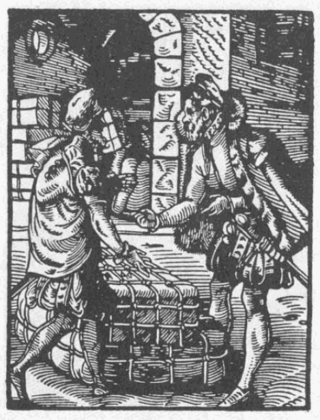
Trade involves the transfer of goods and services from one person or entity to another, often in exchange for money. Economists refer to a system or network that allows trade as a market.

Copts are a Christian ethnoreligious group indigenous to Northeast Africa who have primarily inhabited the area of modern Egypt and Sudan since antiquity. They are the largest Christian denomination in Egypt and the Middle East, as well as in Sudan and Libya. Copts account for roughly 5–15 percent of the population of Egypt; Copts in Sudan account for 1 percent of the Sudanese population, and Copts in Libya similarly account for 1 percent of the Libyan population.

The Bibliotheca Alexandrina (BA) is a major library and cultural center on the shore of the Mediterranean Sea in Alexandria, Egypt. It is a commemoration of the Library of Alexandria, once one of the largest libraries worldwide, which was lost in antiquity. The Bibliotheca Alexandrina contains books in classical Arabic, English, and French languages.
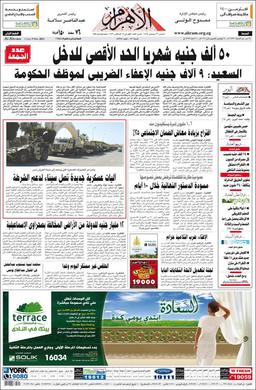
Al-Ahram, founded on 5 August 1876, is the most widely circulating Egyptian daily newspaper, and the second oldest after Al-Waqa'i' al-Misriyya. It is majority owned by the Egyptian government, and is considered a newspaper of record for Egypt.

The Greek diaspora, also known as Omogenia, are the communities of Greeks living outside of Greece and Cyprus.
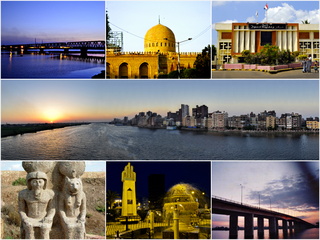
Desouk is a city in northern Egypt. Located 80 km east of Alexandria, in the Kafr El Sheikh Governorate and had a population of 137,660 inhabitants as of 2011. It is bordered to the west by the Beheira Governorate.
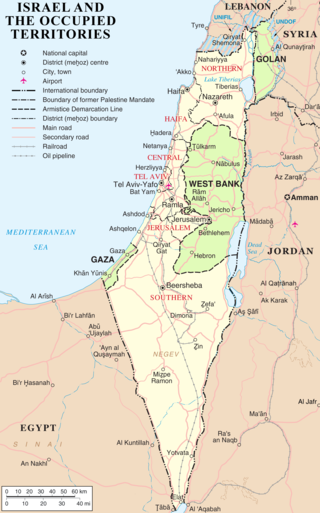
Israel has occupied the Palestinian territories and the Golan Heights since the Six-Day War of 1967. It previously occupied the Sinai Peninsula and southern Lebanon as well. Prior to 1967, the Palestinian territories was split between the Gaza Strip controlled by Egypt and the West Bank by Jordan, while the Sinai Peninsula and the Golan Heights are parts of Egypt and Syria, respectively. The Israeli occupation of the Palestinian territories and the Golan Heights, where Israel had transferred its parts of population there and built large settlements, is the longest military occupation in modern history.
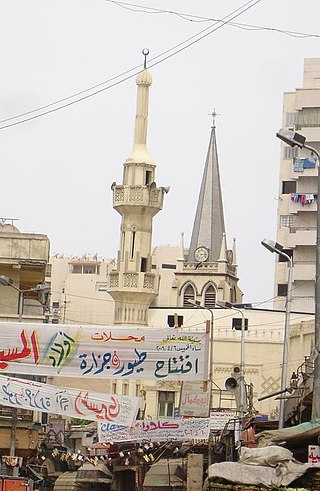
Religion in Egypt controls many aspects of social life and is endorsed by law. The state religion of Egypt is Islam, although estimates vary greatly in the absence of official statistics. Since the 2006 census, religion has been excluded, and thus available statistics are estimates made by religious and non-governmental agencies. The country is majority Sunni Muslim, with the next largest religious group being Coptic Orthodox Christians. The exact numbers are subject to controversy, with Christians alleging that they have been systemically under-counted in existing censuses.

Alexandria University is a public university in Alexandria, Egypt. It was established in 1938 as a satellite of Fouad University, becoming an independent entity in 1942. It was known as Farouk University until after the Egyptian Revolution of 1952, when its name was changed to the University of Alexandria. Taha Hussein was the founding rector of Alexandria University. It is now the second largest university in Egypt and has many affiliations to various universities for ongoing research.

The Swedish Meteorological and Hydrological Institute is a Swedish government agency and operates under the Ministry of Climate and Enterprise. SMHI has expertise within the areas of meteorology, hydrology and oceanography, and has extensive service and business operations within these areas.

Italians in Egypt, also referred to as Italian Egyptians, are Egyptian-born citizens who are fully or partially of Italian descent, whose ancestors were Italians who emigrated to Egypt during the Italian diaspora, or Italian-born people in Egypt. This Italian community have a history that goes back to Roman times.

Egypt, officially the Arab Republic of Egypt, is a transcontinental country spanning the northeast corner of Africa and the Sinai Peninsula in the southwest corner of Asia. It is bordered by the Mediterranean Sea to the north, the Gaza Strip of Palestine and Israel to the northeast, the Red Sea to the east, Sudan to the south, and Libya to the west. The Gulf of Aqaba in the northeast separates Egypt from Jordan and Saudi Arabia. Cairo is the capital and largest city of Egypt, while Alexandria, the second-largest city, is an important industrial and tourist hub at the Mediterranean coast. At approximately 110 million inhabitants, Egypt is the 14th-most populated country in the world, and the third-most populated in Africa.
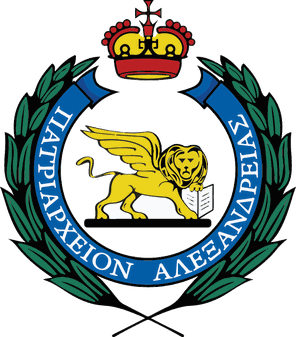
The Greek OrthodoxPatriarchate of Alexandria and all Africa, also known as the Greek Orthodox Church of Alexandria, is an autocephalous patriarchate that is part of the Eastern Orthodox Church. Its seat is in Alexandria and it has canonical responsibility for the entire African continent.

Throughout the 20th century, Iraq witnessed multiple periods of instability and conflict that prompted the creation and flight of many refugees. Earlier examples include the exodus of Iraqi Jews and the flight of Iraqi Kurds. The Iraqi invasion of Iran in 1980 and the ensuing Iran–Iraq War (1980–1988) triggered a deterioration of ties among the country's various ethnic and religious communities, and also exacerbated in violent events like the Ba'athist Arabization campaigns in northern Iraq (1968–2003), which led to the killing and displacement of thousands of minorities. The Iraqi invasion of Kuwait (1990) and the ensuing Gulf War (1990–1991), which ended with Iraq's defeat and the application of United Nations sanctions (1991–2003), also resulted in the creation of many Iraqi refugees. It was not until the beginning of the ongoing Iraqi conflict, however, that sustained waves of Iraqi refugees would be created, numbering in the millions: the 2003 invasion of Iraq and the ensuing Iraq War (2003–2011) killed and displaced hundreds of thousands of Iraqis, both internally and externally, and the later War in Iraq (2003–2017) forced even more people to flee from the country. Many Iraqi refugees established themselves in urban areas of other countries rather than in refugee camps.

Christianity is the second largest religion in Egypt. The vast majority of Egyptian Christians are Copts. As of 2019, Copts in Egypt make up approximately 10 percent of the nation's population, with an estimated population of 9.5 million or 10 million. In 2018, approximately 90% of Egyptian Christians were Coptic Orthodox.
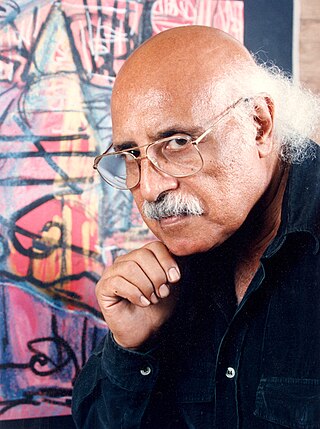
Hussein El Gebaly (Arabic: حسين الجبالي) was an Egyptian artist.

Telecomix is a decentralized cluster of net activists, committed to the freedom of expression and is a name used by both WeRebuild and Telecomix. WeRebuild is a collaborative project used to propose and discuss laws as well as to collect information about politics and politicians. The Telecomix is the operative body that executes schemes and proposals presented by the WeRebuild. On September 15, 2011, Telecomix diverted all connections to the Syrian web, and redirected internauts to a page with instructions to bypass censorship.

The Caesareum of Alexandria is an ancient temple in Alexandria, Egypt. It was conceived by Cleopatra VII of the Ptolemaic kingdom, the last pharaoh of Ancient Egypt, to honour her first known lover Julius Caesar or Mark Antony. The edifice was finished by the Roman emperor Augustus, after he defeated Mark Antony and Cleopatra in Egypt. He destroyed all traces of Antony in Alexandria, and apparently dedicated the temple to his own cult.

Egyptian–Kosovan relations are foreign relations between Egypt and Kosovo.
References
- ↑ Swedish Institute Alexandria website Archived 2010-06-06 at the Wayback Machine
- ↑ About the Swedish Institute Alexandria Archived 2012-02-29 at the Wayback Machine
- ↑ Background of the Institute Archived 2012-02-29 at the Wayback Machine
- ↑ About the closing and temporary relocation of the institute Archived 2020-01-22 at the Wayback Machine